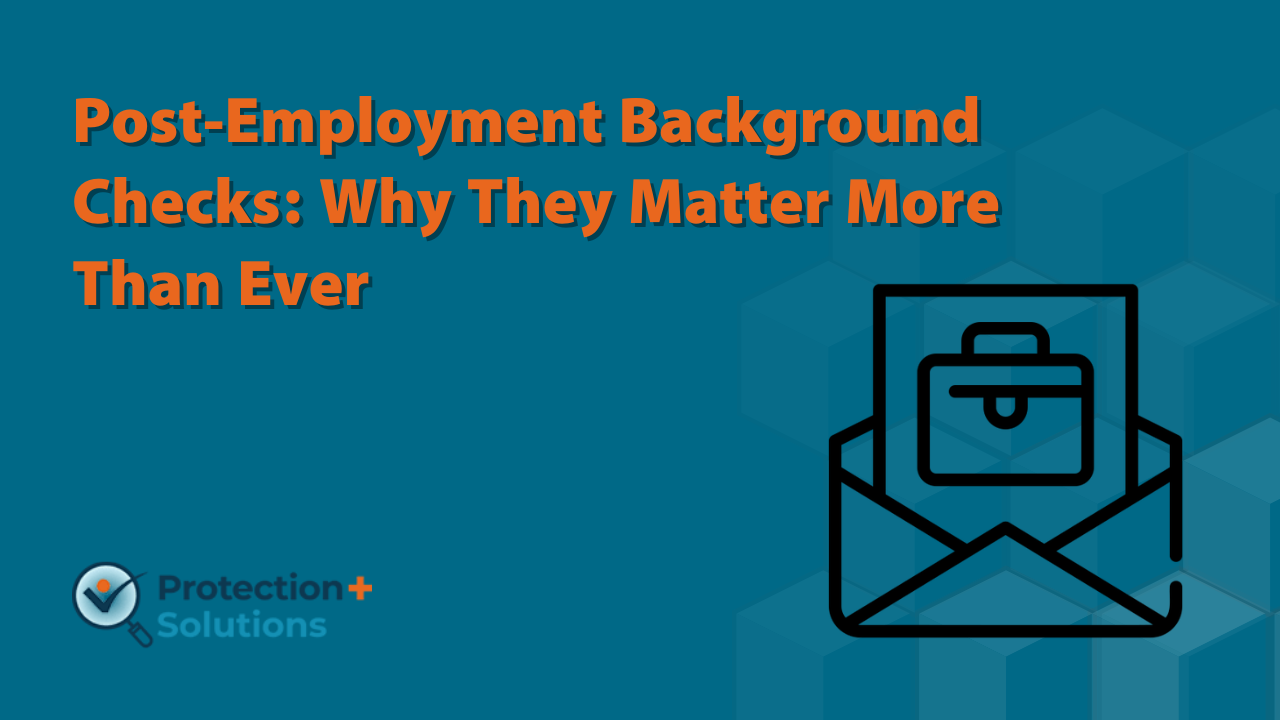Post-Employment Background Checks: Why They Matter More Than Ever

Ever thought your job was safe after you got it? Well, think again. These days, many companies aren’t just checking your background before you join—they’re checking it after you’ve been hired too. It’s called a post-employment background checks, and it’s becoming more common across industries. But why? Let’s dive in and find out.
Pre-Employment vs. Post-Employment Checks
Most people are familiar with pre-employment checks. You apply for a job, and before you’re hired, the company checks your background. But post-employment checks happen after you’re already part of the team. Sounds intrusive? It can be—but sometimes it’s necessary.
Why Employers Conduct Post-Employment Background Checks
Risk Mitigation and Workplace Safety
Let’s face it—people change. Someone with a clean record at hiring may get into legal trouble later. Regular checks help companies spot red flags before they turn into disasters.
Legal and Regulatory Compliance
In certain sectors, especially healthcare and finance, the law may require ongoing screenings. Failing to stay compliant could cost companies big time.
Protecting Company Reputation
Your employees represent your brand. If one of them commits fraud, harassment, or any serious misconduct, it reflects badly on the entire company.
Internal Promotions and Role Changes
Got your eye on a promotion? You might need to pass another background check. Higher roles often come with more responsibility—and more scrutiny.
Industries Where Post-Employment Checks Are Critical
Finance and Banking
These industries handle sensitive financial data and assets. One wrong move can cost millions. That’s why background checks don’t stop at hiring.
Healthcare
Doctors, nurses, and caregivers deal with vulnerable populations. Ongoing screenings are essential to maintain patient trust and safety.
Education
Teachers and staff are role models for students. Schools can’t afford to employ someone with a hidden criminal past.
Government and Defense
Security clearances, national safety, and sensitive data? You bet there are continuous background checks here.
What Do Post-Employment Background Checks Include?
Criminal Record Checks
Has the employee been arrested or convicted after being hired? This info is critical, especially for roles involving security or money.
Credit History Checks
Poor financial behavior can be a red flag, particularly in finance-related roles.
Professional License Verifications
Is your employee still licensed to do the job they were hired for? Periodic checks confirm this.
Drug Testing and Health Screenings
Some industries require employees to stay drug-free. Random or scheduled testing ensures compliance.
Social Media and Online Presence Audits
A controversial tweet or a public rant can damage your company’s image. Employers now watch social platforms more than ever.
How to Implement a Post-Employment Screening Policy
Establishing a Clear Policy
Write down everything—what checks you’ll do, how often, and why. Ambiguity breeds distrust.
Communicating With Employees
Be upfront. Tell your team what you’re doing and how it protects them too.
Choosing the Right Screening Partner
Work with licensed and ethical third-party providers who know the law and value privacy.
Ensuring Consistency and Fairness
No favoritism. Apply the same rules to everyone to avoid legal trouble and maintain workplace harmony.
Ethical Concerns and Employee Trust
Transparency and Openness
Want your employees to trust you? Don’t keep secrets. Be clear about what’s being checked and why.
Avoiding Discrimination
Background checks should never be used to target or punish specific groups. That’s not just unethical—it’s illegal.
Balancing Security with Privacy
Yes, safety matters. But so does privacy. Don’t dig too deep or you’ll end up with more backlash than benefits.
The Role of Technology in Post-Employment Checks
AI and Automation in Background Screening
AI can scan databases and flag issues in real time. Faster, smarter, and more accurate.
Real-Time Monitoring Services
Some platforms offer continuous monitoring, alerting HR when an employee is arrested or loses a license.
Data Security and Confidentiality
With great data comes great responsibility. Always ensure employee info is protected and encrypted.
Pros and Cons of Post-Employment Background Checks
Pros
- Improved workplace safety
- Reduced legal risk
- Enhanced reputation
- Better internal promotions
Cons
- Potential trust issues
- Risk of bias or misuse
- Legal challenges
- Added costs
Future Trends in Post-Employment Screening
Continuous Monitoring Systems
Like a security system for your workforce. Alerts in real time—before trouble escalates.
Integration with HR Tech Stacks
Soon, background checks will plug directly into HR software, making the process seamless and automated.
Conclusion
Post-employment background checks aren’t about distrust they’re about responsibility. In a world where risks evolve daily, businesses can’t afford to take a “set it and forget it” approach. Ongoing screening ensures your team stays trustworthy, compliant, and aligned with your company’s values. Just remember do it fairly, do it legally, and do it transparently.
Contact PPS for free consultation

